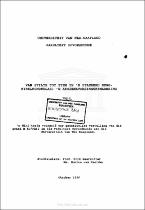Van stilte tot stem in 'n standerd nege bybelkundeklas : 'n aksie navorsingsbenadering
Abstract
This mini-thesis addresses various themes which all focus on a disquieting silence I observed in my standard nine biblical studies class. The main theme of this paper, however, is the silence of the marginalised and disadvantaged pupils in the classroom situation. The research was done in Mitchell-'s Plain, a suburb of broader Cape Town. My research was initially approached with the assumption that pupils should participate more actively in their own educational processes, that they should essentially talk more' in the classroom. Because this was not the pattern in my class, the initial general planning for my research was focused on the means to eliminate this 'unnatural' phenomenon. A penetrating and critical reflection on my own personal and professional development, the social realities of my research group and the location of the research, added a new perspective to the research. In discussions around the silence of the disadvantaged pupil, I endeavour to show how various innovations were implemented into an established practice to try and minimalise it. My reading of the Literature on critical education, especially the work of PauIo Freire, contributed significantly to greater insight into the silence in my class. This also allowed me, to approach my practice, and my students, with a 'clearer understanding of possible causes' I consequently researched the silence against a background of the socio-economic and political realities of the students involved in the research. Another theme that is developed in this mini-thesis, is a journey towards knowing that was undertaken by an experienced teacher. This exploratory journey was enhanced by my introduction to action research as a methodology to bring about change to a practice by means of an in-depth critical reflection. In the final chapter of this mini-thesis I come to the conclusion that no significant change can ever be realised without the initiator having obtained a deeper understanding of the situation where change needs to be appropriated. The reference to a deeper understanding refers to a holistic understanding regarding the social-, cultural, political and economical history of the group involved in the process of change. In the context of my own conscientization, I address possibilities to minimalize the silence of students who come from difficult socio-economic and political backgrounds, by guiding them to grasping the historical- and political roots of their silence.

